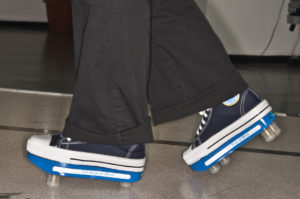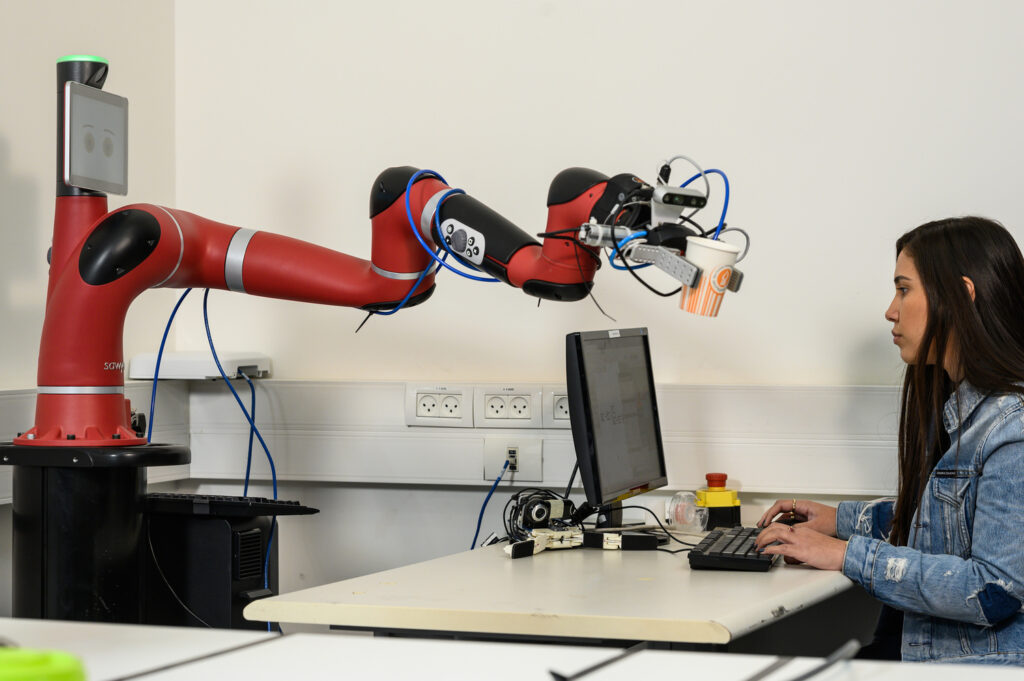
Shoes that (Re)Teach the Brain How to Walk
Shoes that (Re)Teach the Brain How to Walk
June 1, 2015
Medical Research, Robotics & High-Tech
Jewish Journal of Los Angeles — Picture the last time you went for a walk: You may have negotiated uneven pavement, or stepped from grass onto a dirt trail, adjusting to the differences in terrain without much thought.
People with some walking disorders don’t have that ability, but an Israeli-designed invention may help them regain it.
 The Re-Step system uses specially designed shoes to simulate the unpredictability of real-life walking in the controlled setting of the rehab clinic. It signals a novel approach to the treatment of walking difficulties caused by cerebral palsy, stroke or other brain trauma, as well as balance problems that can come with age.
The Re-Step system uses specially designed shoes to simulate the unpredictability of real-life walking in the controlled setting of the rehab clinic. It signals a novel approach to the treatment of walking difficulties caused by cerebral palsy, stroke or other brain trauma, as well as balance problems that can come with age.
BGU’s Dr. Simona Bar-Haim conceived the idea after a chance conversation introduced her to the idea of chaos theory. This theory says that seemingly unpredictable, complex systems often turn out to have patterns. Dr. Bar-Haim suspected that chaos theory could apply to the mechanics of walking and balance.
“Many systems in nature … and our bodies work like a chaotic system,” said Bar-Haim, who heads the Laboratory for Rehabilitation and Motor Control of Walking at Ben-Gurion University of the Negev.
Our heart rate, for example, varies from moment to moment based on the environment and other factors. So does our walking. But brain damage and age can interfere with this adaptability.
“I thought maybe we could restore this flexibility to the damaged brain,” Bar-Haim said.
She teamed with physiologist Mark Belokopytov to develop the Re-Step training technology, which uses unique footwear to help users learn (or relearn) to walk.
The shoes, which weigh about a pound and a half, look like platform high tops with knobs on the bottom. The knobs house small pistons that subtly change height and angle as directed by a customized computer program. Minute movements make the user feel as if he or she is walking on an uneven surface. (One wearer compared it to walking on small potholes.) Sensors on the shoes measure properties of the wearer’s gait, such as speed and symmetry.
The Re-Step program typically involves 22 training sessions of 50 minutes each, supervised by a physical therapist trained to use the system. As the user gains ability, the system increases in difficulty.
Wearers cannot rely on what they see because they have the sensation of walking on uneven terrain even as they walk on a flat surface. They must compensate for this discrepancy by using balance. The idea is that as the brain responds to the perceived changes, it learns how to walk and balance.
“Traditional physical therapy and rehabilitation of walking is based on knowledge from the mid-20th century that believes … the goal is to be ‘normal’ again,” Bar-Haim said.
“But the new trend in 21st-century neuroscience [supports] inducing error into rehabilitation training. … Ours is the first technology to put this theory into practice.”
At Ben-Gurion University, Bar-Haim has received a major grant from the Israel Insurance Association for a three-year study to investigate how the Re-Step system can help individuals who have suffered traumatic brain injury in a car accident.
She believes the field of physical therapy is on the cusp of nothing less than a revolution thanks to the introduction of technology.
“Technology and robotics can induce an artificial environment that manual therapy cannot,” she said. “Technology also provides accurate, objective information and data that we couldn’t receive in the past.”
As someone who began her career as a physical therapist and has devoted it to helping people regain mobility, Bar-Haim gets particular satisfaction from the results she has seen.
“Mobility means freedom and autonomy for everyone — including persons with disabilities,” she said. “We are proud to develop [a way to restore] the freedom of walking to those who lost it.”
Re-Step clinics exist in Israel and Turkey, and negotiations with China are under way. But Step of Mind has not yet been able to secure the funding and support necessary to obtain Food and Drug Administration approval and enter the U.S. market.
See the full article by Nancy Sokoler Steiner on the Jewish Journal website >>



